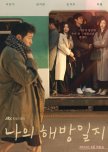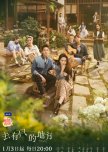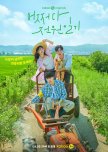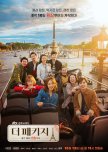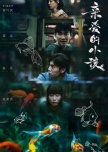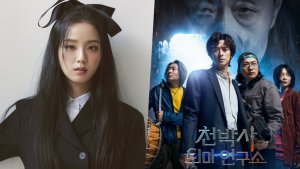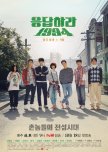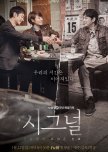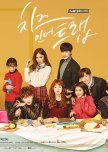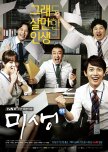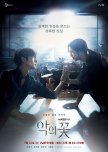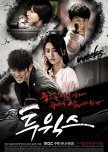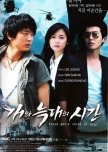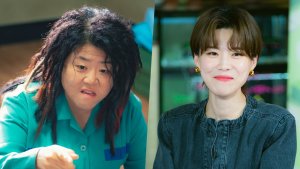 Lee Jung Eun and Jang Do Yeon to Cameo on the Finale of “Behind Your Touch”!
Lee Jung Eun and Jang Do Yeon to Cameo on the Finale of “Behind Your Touch”! Iubirea e dulce-amăruie, iar viața are suișuri și coborâșuri în poveștile unor oameni care trăiesc și muncesc pe tumultuoasa insulă Jeju. (Sursă: Netflix) Editează Traducerea
- Română
- 中文(台灣)
- Arabic
- Русский
- Titlu Nativ: 우리들의 블루스
- De asemenea cunoscut ca și: Ulideului Beulluseu , Our Blues
- Scenarist: Noh Hee Kyung
- Regizor: Kim Kyu Tae, Lee Jung Mook
- Genuri: Romantism, Viaţă, Dramă, Melodramă
Cast și credite
- Lee Byung Hun Rol Principal
- Shin Min Ah Rol Principal
- Cha Seung Won Rol Principal
- Lee Jung Eun Rol Principal
- Uhm Jung Hwa Rol Principal
- Han Ji Min Rol Principal
Recenzie

Outstanding! A KDrama that somehow satisfyingly feeds the human heart.
The KDrama "Our Blues" unfolds a distinctive magic that gently stretches its silken net around the hearts of the viewers and thus spreads warmth. Big KDrama!Re. musical genre: the blues is a kind of lament, sad in nature and born of pain. In "Our Blues" it's not the lamentations of slaves on the plantations, but those of several very average people living where South Koreans prefer to go for vacation: Jeju Island. The protagonists´ lifes are in no way spectacular. They are rather normal for their age and the place. They work hard for their income, live simply and often on what the land (and in this case the sea) offers them. From the buzz of these individual and yet so normal lamentations, a sense of unity grows, that even transcends the screen - because many can sympathize with it and identify with their painful and often humiliating experiences in their own way. That makes it "OUR" blues in several ways. It reaches out from the world of the KDrama into the world of the audience and brings us as people from all over the world a bit closer to each other.
"Our Blues" fondly tells a dozen stories about disappointments and unhealed mental wounds that many people know in one way or another and may have experienced themselves. Most of the protagonists (all wonderful first-class cast!) have known each other more or less since childhood. They form a community of colleagues, friends, family and family of choice. Although Jeju-do is South Korea's largest island, it is relatively small at 73 km x 31 km. At its center, South Korea's highest mountain - the dormant Hallasan Volcano - divides the island into the northern area around the city of Jeju and the southern area around the city of Seogwipo. Seogwipo has an urban center with the harbor and then there is urban sprawl with village structures along the coast. This city characterizes the living environment of the characters. As audience, we accompany some of them in a kind of latent mental process of molting.
Some say there is no such thing as a storyline in "Our Blues". In fact, it is more of a composition, or rather a kaleidoscope of independent lamentations. At the core of each lies an ancient pain. What's magnificent about "Our Blues" is that (and how) these songs are finally being sung and thus make space for light and love. For far too long, the protagonists have kept their pain deeply hidden within. They tried to live with it neatly packed away, instead of 'giving' it some space. Yet, sooner or later, the old pain just 'takes' its space... for 20 episodes...
I would´t call it healing, rather transformation, because the painful experience of the past is and remains what it was. However, the potential of what is possible in the future is changing. When the pain in the heart is finally allowed to find space and show itself, it can be witnessed and receive the recognition it deserves. The spasm dissolves and energy is released. Thus new experiences are now possible in the future.
Wanting to spare oneself or others, or wanting to avoid conflict and confrontation, has ultimately never really worked or done any good. Actually, emotional pain and psychological suffering have something to offer: they are the key to opening a portal to a new dimension of truthfulness. The recipe is quite simple: friction (in a deliberately tangible sense of rubbing) facilitates closeness. The problem that prevents this potential for closeness is very human: fear. Because the prerequisite is that I have to honestly show myself as I am (e.g. with my feelings). In doing so, I make myself vulnerable. But only then someone dear to me can reach out and touch me for real. And only in this way true encounter between me and the world becomes possible. Self-assured. Aware of myself. Straightforward. Straight. Upright.
In this KDrama lamentations are ´sung´ and ´heard´. Deep down they are sad, true enough. Yet, it makes you happy, that they are sung at last. And it is just beautiful the way those stories are told: The variety of stories about friendship dynamics, unrequited love and sensitive family relationships are affectionately interwoven in many layers and gain in radiance. We repeatedly encounter individual protagonists in several contexts. One person after the other ... we can´t help to grow fond of them. Ultimately, besides the very human blues that life inevitably offers as a portal to become who we are, the constants in all time, here, there and everywhere, are the sea around us and the sky above. Jeju-do as location for this KDama just hits the spot!
A KDrama that somehow satisfyingly feeds the human heart.
(By the way: "Our Blues" has become one of the highest-rated series on South Korean cable television. Viewer ratings have doubled from episode 1 to 20. (As I said, you grow fond of it over time...)
----------------- SIDE NOTE: --- Haenyeo = sea women or daughters of the sea ---
Jeju-do is famous not only as a tourist hotspot with boardwalks and hotels for honeymooners (Jeju International Airport is the third largest in the country), but also for its volcanic landscape, which is now a World Heritage Site. Yet, furthermore, characteristic of the island's tradition are the Haenyeos, who have been diving for centuries without oxygen tanks for abalone (or sea snails) and other sea food. Especially abalone is plentiful on the seabed around the island. However, these are not so easy to harvest by conventional fishing industry.
To this day, the archaic way of free diving is the only proven one: hold your breath, dive down with a hook, a weight belt and a small net, and then skilfully scrape the seafood off the rocks at the bottom. Today, wetsuits, diving goggles and fins help. A buoy marks the 'area'. Not everyone can do that. Apparently women are particularly good at it. Often families practice this craft for many generations already. The technique of holding your breath for around 3 minutes at high underwater pressure, even at a water temperature of 8 °C, is usually passed on to the daughter. (Actually, in these circles the birth of a daughter is finally empathically praised and extensively celebrated.)
The income of the sought-after Haenyeo has become quite respectable. They are economically independent by now. These days, however, there is shadow to it, too. Being able to finance university studies for their offspring, the young generation nowadays prefers to move to the mainland for higher education and more comfortable jobs. Accordingly, the Haenyeos could soon become extinct. Nevertheless, once you are a Haenyeo, you stay with the diving until old age.
----------------------------------------------------------------------------------------------------
Considerați utilă această recenzie?

the_sapio_nerd
95 oamenii au considerat această recenzie utilă
Blue is the warmest colour.
Blue indeed is a colour of warmth and as an object, is a compassionate ode to the vagaries of the heart. The emotional honesty, precision, abandon and need; all summed up within the blue, have been the greatest force of love and benignancy. Letting the blue sky meet the blue sea could lead to bedazzling consequences, opening unimaginable possibilities. "Our Blues", the drama and it's stories illustrate as well exhibit the blues of a varied spectrums of lives and the arrays to which the life can haul us to.Produced by 'GTist' and developed by 'Studio Dragon', "OUR BLUES (우리들의 블루스)" is an omnibus-themed Kdrama created and nourished by none-other-than one of the best Korean writer Noh Hee Kyung jakka-nim. Joins her, her partner-in-crime, Kim Kyu Tae PDnim, assisted by Lee Jung Mook PD-nim as a debutant who's in fact been the executive producer of several qualitative hits. With a super-duper multi-starrer cast, the show was originally broadcasted on tvN whereas Netflix is in charge of international distribution. This also marks Kim Woo Bin's comeback drama after 6 years long hiatus and has been shot in Jeju Oil Feild, while a fraction of it has been filmed in cities like Seoul and Mokpo.
Established against the backdrop of Korea's Pureung-ri in the famous Seogwipo, the 2nd largest city on Jeju-do island or the southern part of Jeju Province, "Our Blues" is formatted as an omnibus tale of 14 characters, divided into 8 stories, told in a total of 20 episodes. While the term "omnibus" literally refers to different stories in a single book, the drama takes on characters living in the same neighbourhood who are interconnected and their path crosses on a daily basis, but the manner of presentation emphasizes only 2 of them at a time. In simple words, at a particular, time only a few characters are the protagonist of the story, having them at climax/peak, whereas others are simply extrinsic parts of their lives, coming in and going out of the scene randomly.
The drama is a true example of what you called a star-studded cast, filled not only with soooo many popularly acclaimed and skillfully talented actors but also with renowned makers who have always proved their worth. Among many, the major cast are: Kim Hye Ja, Go Doo Shim, Lee Jung Eun, Cha Seung Won, Shin Min Ah, Han Ji Min, Lee Byung Hun, Kim Woo Bin, Uhm Jung Hwa, Choi Young Joon, Park Ji Hwan, Bae Hyun Sung and Roh Yoon Seo. Special mention to the child actress Gi So Yoo who played Son Eun Gi and won hearts with her realistic acting of a 5 years old child.
In supporting cast, the familiar faces are: Kim Kwang Gyu, Nam Kyu Hee, Cho Hye Jung, Baek Seung Do, Lee So Byul, Park Jee A and Yoon Byung Hee. Again, special mention to Jung Eun Hye who played Lee Young Hee, a person with Down's syndrome, who, in real, is someone with the syndrome, and did a spectacular job. There are so many other known faces in guest roles, here and there in the show.
Rather than writing a character description, describing different stories without spoilers is a better choice. It's important bcs the drama doesn't have a particular plotline, and as told earlier, it consists of several stories.
# Eun Hi and Han Su: The wealthiest fish trader Eun Hi, who's loved by the entire neighborhood, reunites with her long-missed first love Han Su, whom she dated during highschool but grew apart due to individual situations.
# Yeong Ju and Hyun: These 2 highschool students who live in the same apartment, and been friends since childhood, secretly start dating and plan to fly to Seoul after graduating. However, an unexpected hurdle come their way, disturbing their entire wishes.
# Seon-a and Dong Seok: Thinking she's hit the rock bottom, Seon-a travels to Jeju, where she meets his first love Dong Seok, whom she'd abandoned years back. Still, uncertain about their feelings, both of them become friends again and help each other comfort.
# In Gwon and Ho Sik: Considered brothers from different mothers, Ho Sik and Ingwon had been there for each other through thick and thins, but as life happens to them, they grow apart, resenting each other for years. Now that their children are involved, they seem unable to turn away, rather fight it off.
# Young Ok, Jung Jun and Young Hee: As Young Ok and Jung Jun grow closer, Youngok's uncertainties have always bugged Jung Jun, and he's afraid of being left back. There enters Young Hee, bringing love to the city and to the relationship between the couple.
# Eun Hi and Mi Ran: The highschool duo, the rich Mi Ran and the poor Eun Hi, known as princess and maid, respectively, has always been there for each other. But there exists misunderstandings created due to own's sense, which has to be dealt with.
# Chun Hee and Eun Gi: The boss of sea Chun Hee samchun is excited for her family's comeback to Jeju to live with her. But as life becomes cruel, not knowing what's happening, she is left to take care of her granddaughter Eun Gi, who's adorable yet irritating.
# Ok Dong and Dong Seok: On the verge of death, Ok Dong samchun wishes to make up with her son Dong Seok, who resents his mother and has separated for long. As they set out on their first and last trip together, will they be able to clear the distance between them?
I do wish to elaborate a little about the topics the drama has attempted to tease and start conversations about, and doing this separately without character names, in order to avoid spoiler...... The most important element the drama tries to emphasize on is depression and related mental health issues; through a character, the drama shows how severe depression affects the lifestyle of one as well as their relationship with others. I believe it's one of those few shows, having the real symptoms of depression, that can be triggering. The 2nd most important placed is Down's Syndrome, a specially-abled person and the way of embracing them; I loved how well they have tried to draw basic notions about the normalcy of it, it was simply overwhelming.
Unprotected sex and teenage pregnancy are 2 other important elements showcased in the story, through which the writer might not have put forth the cons of it, but using it she's demonstrated the possibilities of growths in relationships and strengthening of love. Through each of the stories, the drama again, has emphasized the power of confrontation. Confronting one isn't always intended to bring down the rival, rather it provides a great mean of bringing out all the inner thoughts, helping in clearing misunderstandings. On that note, the drama also highlights greatly on self-realization and putting forward the flaws of all the character, which is follows by learning and growth, no matter their age, gender, situation and roles.
One of the many things that I loved about the drama is how they have also clearly shown that, our feelings and complexes about our friendships and other kinds of relationships are not childish or silly, because our thoughts and emotions always carry some values and could burden us to unimaginable levels. Both male and female friendships, the similarities & dissimilarities and the gravities of sentiments have also been pointed out by the writer.
Another thing I liked was the portrayal of real behaviours of the old people; as in showing how they could be irritating, annoying, demanding and adamant about anything, frequently frowning and getting afraid instantly upon being screamed on and still crawling back to their own people, etc. These are not something to really complain about but most of the kdramas do not show it. Rather calm, relaxed and postured sides are the only tools used in typical Kdramas. I hope people don't misunderstand what I am trying to convey, it's simply a way of praising how realistically the makers have presented it. On that note, the makers were able to create a typical suburb environment and bringing out typical village lifestyle and human values.
Additionally, the show throws lights upon many small to big elements like: financial mishaps, aggrandizement of love, fraudulent intentions, custody battles, love for kids, reminiscence of foregone days, secrets and lies, shades of parenting, grudges from past, holding back thoughts, conflicts in group jobs, terminal illness, accidents, being long-term bedridden, poverty, bullying, etc.
The well-crafted show is a proof that something can be fun, exciting, thrilling, emotional and touching even when there isn't much going on in our lives or even in the contrary situations. The intricate and intimate glimpses into a character's life immerse you in their very worlds, not through glamorous and flashy visuals and actions, rather a realistic and relatable presentation; totally wandering, hazy, witty and totally absorbable. The drama successfully captures tumultuous moments, all the joys and all the growing pains meshed together.
The drama marks the comeback script of Noh Hee Kyung jakka-nim after a break of 4 years, but we know she was busy creating another masterpiece yet again. With the experience of over 2 decades and a half and creating numerous popularly acknowledged slice-of-life stories, jakkanim has comeback with a piece that is unique for Kdramas. The drama itself is character driven and the cerebral & in-depth portrayals of life remains the key feature, as her usual signature. The simple yet lesser discussed topics, the elements used to narrate the stories related and the touching plus triggering outcomes from each of them, everything has been sketched with lots if care and sense, that it directly hits the core of thoughts of the viewers.
As the maker of numerous highly acclaimed and huge budget dramas with skyrocketed ratings, Kim Kyu Tae PDnim is one of the top10 directors of Korea. Using the experience of almost 3 decades, he creates stories that most of the viewers are able to live than merely relating with their own lives. The presentation is all that matters, as they say, PDnim has proved to have mastered that craft, which clearly shows. Tell me a point that you thought was off about the flow of the show? Nothing, right? From screenplay management to scenario setup, from script interpretation to scene execution, from screen editing to accessory coordination and finally the filming supervision, everything reflects on how well PDnim has understood his job of absorbing the essence of the script, it's narrative and the storytelling style intended by the writer.
Cinematography of the show, as priorly expected from the audience because of the announcement of story being primarily set up in Jeju-do, went beyond the expectations. The agricultural land of varied green accompanied by propelling huge wind turbines, the coastal vincent and deeper navy blues of the sea paralleling with the story, the mysterious yet mesmerizing bed of ocean-floor decorated with planktons, abalones and conches and the sceneries of sunset and sunrise with contrasting yellow and orange hues, everything had their own significance and provided with alluring sights to the audience. Choosing the gauge, managing the speed, setting the sensitivity with diffusing filters and adjusting to an aesthetic frame with appropriate lens, the director of photography surely has mastered the art of moving photography.
The silhouettes of single houses with rock boundaries, having flowers blossomed on them, did serve as an unusual visual elements to me. I think I can stare at them for hours and still won't get bored. The marketplace was another location frequented by the characters, a place where almost all of them crossed paths on daily basis and from our pov, every single day. It was the place where several peak moments took place and served as a buffered zone, typical of village scenarios (though the show is set up in a town). The profuse number of occupations, little details added to their jobs and their ample contributions to the trade and business of the region, even so subtly, it's been shown resplendently.
The exclusive Jeju dialect (제주방언: bang'eon) used in the drama makes it even more indulging, particularly for people like me who're into language. The larger and more conservative vowel inventory of the dialect and nouns ending with ㅁ (m), make it unique. There were few moments where the characters used pure Jejueo for which the makers have given subtitles with standard Korean language.
Putting the emotions and momentarily paused reactions in a "frame" is how they want to emphasize that how the beauty of art is more to do with the backgrounds, rather than the art itself, which implies the small yet bonny inputs into our lives.
'Building back broken houses' (Ingwon and Hosik) or parts of it signify how the living entities always require to be mended with love, care and warmth. It's always wise to restore back what we have than desiring to get what we don't have. Even when things like approach and apology serve as saviors of relationships that you want to hold onto, do it.
'Harvesting abalone and conches, together', as the hanyeos said "We move as one", tells how unity is the key to prosperity. Before the fruits of prosperity can come, the storms of life need to first bring the required rains of testing, which mixes with the seeds of wisdom to produce a mature harvest. The lives of hanyeos reflected that a lot.
'Painting walls' (Dongseok and Yeong Jun) as a sign of renewing the preexisting ecstasy of life with a different colours, as your situations suit. Painting both dreams and nightmares, with one step further, painting own's reality, might result in eternity.
'Writing down the curiosity and thoughts' instantly is a tool for many to relief their pain, more than just keeping tracks. Dairy-keeping is not as simple as it seems and turning your diary into your best possible story, could be considered a miracle. While maintaining one, when you've struck the right vein, tiredness goes. It must be an effort, thinking wrong.
'One stone at a time', for life and prosperity; rock balancing is not new in Kdramas but through Ok Dong samchun, Noh jakka has tried to present the ways to extract hope from balancing rocks, slowly and steadily.
The coming-of-age essences to the stories and the characters serve as a perfect device to nourish the vitality of the messages the writer desires to give away to her audiences. The psychological and moral growth/transition of the characters, from a point of misery to prosperity or vice versa, has been a mesmerising chronicle to witness and preserve. Personal growth and change of them, contributed by different others, signifying the importance of community life, particularly in village, where all of them are protagonists of their own stories, makes it gratifying, which is again feathered by the beautiful dialogues, emotional responses and sumptuous actions & reactions.
Composed by Choi Seung-kwon and Kim Ji-soo, there are 10 OSTs in total, all sung by very skillful vocalists of South Korea, bringing back the OST queens back to track. I love how amazingly the OSTs have been used in the drama.
# "The Last" by Heize is my most favourite which is a comforting track about the warm moments in love.
# "Remember Me " by Davichi is a melancholic song about reminiscences.
# "With You" by Jimin (BTS) and Ha Sung Woon is a softcore and mesmerizing track depicting desires and confession.
# "For Love" by 10cm is a jolly romantic track as an ode to blooming love.
# "Whisky on the Rock" by Kim Yeonji is a retro-styled song with gracious vocals is an ode to the old and care free days.
# "ONCE AGAIN" by Winter and NingNing is a song about assurance of staying beside.
# "By My Side" by Taeyeon (GG) is a melancholically healing song about regrets.
# "Bye Bye" by Punch is a mellifluous song about missed opportunities.
# "Happy Song" by MeloMance is indeed a song about happiness and hopes.
# "STAR" by STAYC is about the beauty of love, written with gratifying lyrics.
The opening theme at the beginning of each episode with aesthetic set ups, as someone picks up the record for characters meant for that episode, playing the record player and unfurling their stories, all these provided great joy and was ecstatic.
Apart from these, the drama also has many old songs, not only Korean but non-Korean along with classic jazz, that has been either used as a background, or played/sung by the characters. The 1962 Italian pop classic song "Quando Quando Quando" by Tony Renis as well as it's English version cover by Korean singer Moon Haewon (문해원) is the most mesmerizing. "Our Blues,Our Life" by Lim Young Woong is a beautiful track.
My most favourite dialogue is...
"I heard this typhoon will pass by. But again, all of them do. Just like this typhoon, everything will eventually pass by soon. Now get some sleep, Yeong Joo-ah~ I love you."
Final Remarks... And just like that, once again, another drama has made me question my worth for daring to judge it; it took a lot of efforts to put my feelings and experiences into words. Another masterpiece slice-of-life drama is OUR BLUES which will be placed in the deepest cores of our hearts and remembered, for it was beautiful, healing and profoundly heartwarming, making us to think, resonate, rationalize and acknowledge the determinants life throws at us. I would have loved if it were more, I mean, at least that's what I desperately wished for. I would like to offer my gratitude to Noh jakka from offering us another spellbinding piece of art. Thank you to each and every one involved.
Considerați utilă această recenzie?

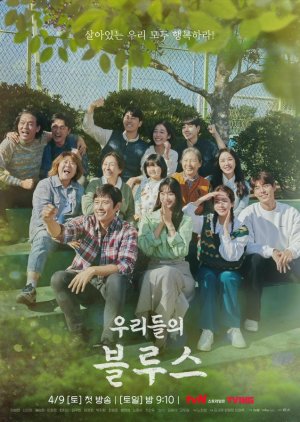








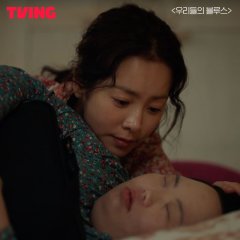
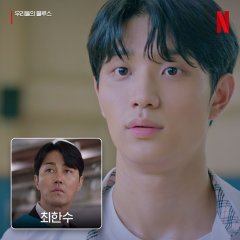
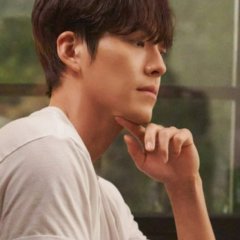
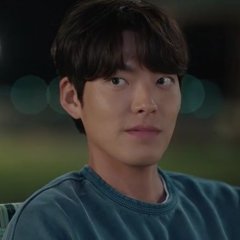
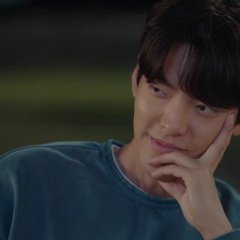

 1
1 1
1 1
1
